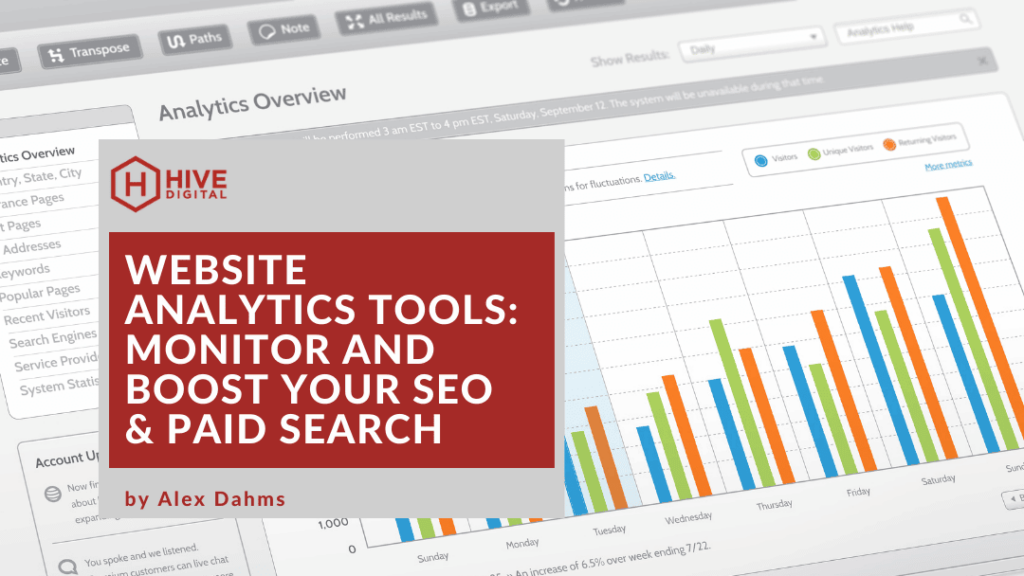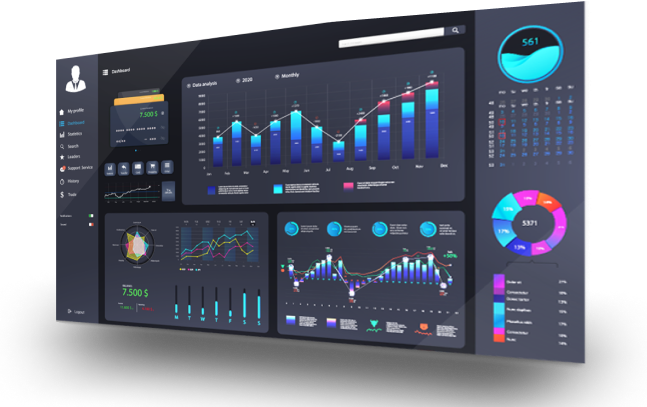When you thoroughly understand your website traffic and user behavior, it serves as the first stepping stone to success in the world of digital marketing. With the right tools, you can gain valuable insights into how visitors interact with your site, which helps you strategize on how to optimize your search engine performance and enhance your paid search efforts. Let’s explore how three powerful and free tools — Google Analytics, Google Search Console, and Microsoft Clarity — can help you monitor and improve your SEO and paid search strategies.
Leverage Website Analytics for SEO & Paid Search Success
Website analytics offer a window into the performance of your online marketing efforts. Traffic patterns, user demographics, and user behavior on your site all need to be analyzed so you can make informed decisions that boost your SEO and paid search results. The ability to track, measure, and understand these metrics will optimize your digital marketing campaigns and ensure you are reaching the right audience effectively.
The Powerhouse Trio: Google Analytics, Google Search Console, and Microsoft Clarity
Google Analytics (GA): The Cornerstone of Data
What is Google Analytics?
Google Analytics (GA) is a comprehensive tool that tracks various aspects of website performance. It collects data on traffic sources, user demographics, conversion rates, and other defined metrics. Overall, GA allows you to fine-tune your marketing strategies by providing a detailed overview of how users interact with your website.
How GA Helps with SEO & Paid Search
- Keyword Analysis: GA identifies the keywords driving traffic to your site, enabling you to optimize content for those terms.
- Campaign Tracking: Monitor the performance of your paid search campaigns, seeing which ads drive the most traffic and conversions.
- User Pain Points: Discover where users drop off in the conversion process, allowing you to make necessary adjustments to improve user experience and conversion rates.
- Event Tracking: Google Analytics 4 (GA4) supports both standard and custom event tracking. Standard events include user interactions like page views, scrolls, and clicks. GA4 also allows you to create custom events tailored to your specific needs, such as tracking button clicks, form submissions, or any other user actions.
Google Search Console (GSC): Optimizing for Search Engines
What is Google Search Console?
Google Search Console (GSC) is a tool that provides insights on how Google indexes your site and how it performs in search results. It offers data on search queries, indexing status, mobile usability, and more.
How GSC Helps with SEO
- Identify Ranking Opportunities: GSC shows which keywords your site ranks for, helping you identify and capitalize on new ranking opportunities.
- Fix Technical SEO Issues: By highlighting issues such as broken links and indexing errors, GSC helps ensure your site is fully optimized for search engines.
- Understand User Search Intent: Analyze the search queries that lead users to your site, allowing you to tailor your content to better meet their needs.
- Page Experience and Core Web Vitals: GSC provides insights into your site’s page experience and Core Web Vitals, which include metrics like loading performance, interactivity, and visual stability.
Microsoft Clarity: Unveiling User Behavior
What is Microsoft Clarity?
Microsoft Clarity is a user behavior analytics tool that captures session recordings, heatmaps, and click data. It provides a detailed view of how users interact with your website, highlighting areas where they may encounter difficulties.
How Clarity Helps with SEO & Paid Search
- See User Struggles with Forms: Identify where users face challenges in form submission processes, and optimize these areas to improve conversion rates.
- Identify Confusing Website Elements: Clarity highlights elements on your site that may be confusing to users, allowing you to simplify and enhance the user experience.
- Improve Landing Page Effectiveness: Use heatmaps and session recordings to understand how users interact with your landing pages, making data-driven adjustments to increase effectiveness.
Putting it All Together: A Data-Driven Approach
By leveraging the data from Google Analytics, Google Search Console, and Microsoft Clarity, you can create an all-encompassing measure of your website’s performance. For example, use Clarity recordings to understand why users bounce from a high-ranking landing page identified in GSC, and track the effectiveness of your improvements in GA. This collaborative approach allows for continuous optimization based on real user behavior and performance data.
Setting Goals and Tracking Progress in GA
You should set specific, measurable goals in Google Analytics for tracking the progress of your SEO and paid search efforts. Goals could include increasing the number of visitors, improving conversion rates, or reducing bounce rates. Review these goals regularly to ensure your strategies remain aligned with your overall marketing objectives.
Getting Started Google Analytics, Google Search Console, and Microsoft Clarity
Setting up each of these tools is straightforward and supported by extensive free resources and beginner guides.
- Google Analytics: Beginner’s Guide
- Google Search Console: Get Started Guide
- Microsoft Clarity: Setup Instructions
Importance of Data Privacy and User Consent
As a quick note, you must ensure data privacy and obtain user consent before using these analytics tools. Adhere to regulations such as GDPR and CCPA by informing users about data collection practices and providing opt-in mechanisms.
The Bottom Line on Web Analytics Tools
Website analytics are so obviously essential for successful SEO and paid search campaigns. Google Analytics, Google Search Console, and Microsoft Clarity provide the insights that will enable you to optimize your online presence and achieve your marketing goals. After you set up these tools and can utilize the data they provide, you will make informed decisions that drive traffic, improve user experience, and boost conversions.
Ultimately, these tools will undoubtedly take your digital marketing strategies to new heights. Without them you are, in essence, flying blind.










